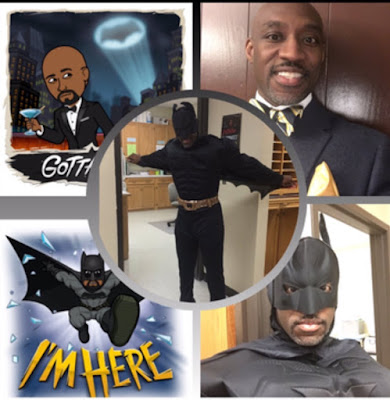Last week, I was talking to a 5th grade young man in front of my office door when he said to me, "Mr. Griffin everyone calls you Batman here at school. I do not want to sound racist (as he begins to loose eye contact with me, I encourage him to keep going), but... Batman is white in all of the movies, and well um, you are kinda not white, you're black!"
I smiled at the young man and shared with him that first and foremost, you are not a racist. You did not do anything to harm me, you did nothing to degrade me, or make me feel bad about who I am as a person. You are not racist, you just made an observation. Here is my question for you, what does Batman stand for as a symbol?
The young man stated that, "Batman stands for doing what is right. Batman protects others."
I said, "Exactly, and as a symbol, I do the same thing for each and every student and teacher in this building when it comes to education."
He stated that, "I guess you're right!"
There were many questions that entered my mind when I reflected on this conversation that included but were not limited too:
How many of my other students think this way (Honestly, I am surprised I have only had two conversations around this topic with students)?
What impact did my alter ego of Batman have on the way this young man viewed the world?
How do we continue to shift the paradigm of heroes in our world when kids aspire to be who they see through the media?
If I can't be Batman, then who can I be?
Colorblindness
At a young age, I was able to see the depictions of color through the media and of those around me. Guess what? My student did not use the barometer of occupation, wealth, status, political connections, or family to question my ability to serve as Batman. He did not even challenge the fact that Batman is a fictional character. He used the color of my skin. As adults we can no longer claim that we do not see the color of our students, our colleagues, or members of our community. The decision to not acknowledge the cultural differences of our community, is a decision that for far too long has cast fear and doubt into the hearts, minds, and spirits of our society. The lack of understanding has given life to stereotypes that live without substance due to an inability to become vulnerable and learn from one another.
Symbols
 I am proud of the fact that I have established the relationship with this young man that he felt comfortable sharing his thoughts with me. A few of my colleagues shared with me the significance of my role as an African-American principal. Dennis, you have to understand there are many individuals that have never truly interacted with a person of color. The only thing that they have to go off of is the perception and stereotypes that the media portrays of people of color. Each and every day you prove that those stereotypes are not true. Not only are you challenging and shifting paradigms, you serve as an advocate for all students, especially your students of color. Dennis, you serve as a symbol of what students will aspire to become in the future.
I am proud of the fact that I have established the relationship with this young man that he felt comfortable sharing his thoughts with me. A few of my colleagues shared with me the significance of my role as an African-American principal. Dennis, you have to understand there are many individuals that have never truly interacted with a person of color. The only thing that they have to go off of is the perception and stereotypes that the media portrays of people of color. Each and every day you prove that those stereotypes are not true. Not only are you challenging and shifting paradigms, you serve as an advocate for all students, especially your students of color. Dennis, you serve as a symbol of what students will aspire to become in the future.I can only hope that I can live up to such an expectation as an #EduHero. I choose to wear the mask on this journey and that decision has often led me to be the only person in the room that looks like me. June 9th, 2017 I became Batman to more than 400 students. I can only hope that when the symbol of Batman is mentioned on their journey they will envision Bruce Wayne and Mr. Griffin; their African-American principal. In turn, my aspiration is that they will heed Dr. King's words, and look at the content of a person's character and not the color of their skin. This is how we pass the mantel of leadership to the next generation.








